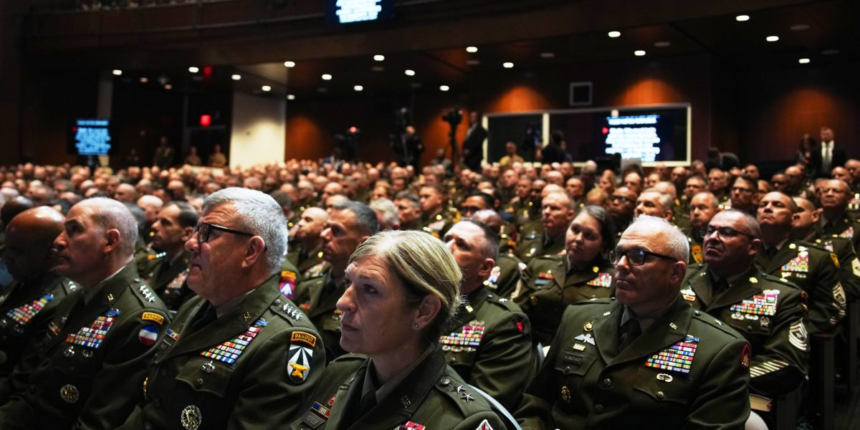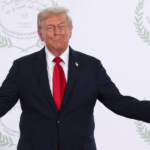The dual messages underscored the Trump administration’s efforts not only to reshape contemporary Pentagon culture but to enlist military resources for the president’s priorities and decidedly domestic purposes, including quelling unrest and violent crime.
“We should use some of these dangerous cities as training grounds for our military,” Trump said. He noted at another point: “We’re under invasion from within. No different than a foreign enemy but more difficult in many ways because they don’t wear uniforms.”
Though meetings between military brass and civilian leaders are nothing new, this gathering had fueled intense speculation about its purpose given the haste with which it was called and the mystery surrounding it. The fact that admirals and generals from conflict zones were summoned for a lecture on race and gender in the military showed the extent to which the country’s culture wars have become a front-and-center agenda item for Hegseth’s Pentagon, even at a time of broad national security concerns across the globe.
Trump is accustomed to boisterous crowds of supporters who laugh at his jokes and applaud his boasting. But he wasn’t getting that kind of soundtrack from the military leaders in attendance.
Trump encouraged the audience at the outset of his speech to applaud as they wished. He then added, “If you don’t like what I’m saying, you can leave the room — of course, there goes your rank, there goes your future.” Some in the crowd laughed.
Before Trump took the stage, Hegseth said in his nearly hourlong speech that the military has promoted too many leaders for the wrong reasons, based on race, gender quotas and “historic firsts.”
“The era of politically correct, overly sensitive don’t-hurt-anyone’s-feelings leadership ends right now at every level,” Hegseth said.
That was echoed by Trump: “The purposes of America military is not to protect anyone’s feelings. It’s to protect our republic.″
″We will not be politically correct when it comes to defending American freedom,” Trump said.
Sen. Jack Reed, the top Democrat on the Senate Armed Services Committee, called the meeting “an expensive, dangerous dereliction of leadership” by the Trump administration.
“Even more troubling was Mr. Hegseth’s ultimatum to America’s senior officers: conform to his political worldview or step aside,” Reed said in a statement, calling it a “profoundly dangerous” demand.
National Guard members are generally exempt from the law since they are under state authority and controlled by governors.
Hegseth said he is easing disciplinary rules and weakening hazing protections, focusing on removing many of the guardrails the military had put in place after numerous scandals and investigations.
He also said he was ordering a review of “the department’s definitions of so-called toxic leadership, bullying and hazing to empower leaders to enforce standards without fear of retribution or second guessing.”
He called for changes to “allow leaders with forgivable, earnest or minor infractions to not be encumbered by those infractions in perpetuity.”
“People make honest mistakes, and our mistakes should not define an entire career,” Hegseth said.
Bullying and toxic leadership have been the suspected and confirmed causes behind numerous military suicides over the past several years, including of Brandon Caserta, a young sailor who was bullied into killing himself in 2018.
A Navy investigation found that Caserta’s supervisor’s “noted belligerence, vulgarity and brash leadership was likely a significant contributing factor in (the sailor)’s decision to end his own life.”
Hegseth used the platform to slam environmental policies and transgender troops while talking up a focus on “the warrior ethos.”
The Pentagon has been told from previous administrations that “our diversity is our strength,” Hegseth said, calling that an “insane fallacy.”
Hegseth said it is not about preventing women from serving.
“But when it comes to any job that requires physical power to perform in combat, those physical standards must be high and gender neutral,” he said. “If women can make it excellent, if not, it is what it is. If that means no women qualify for some combat jobs, so be it. That is not the intent, but it could be the result.”
Sen. Joni Ernst, an Iowa Republican who served in the Iraq War, said Hegseth was “appropriate” in suggesting that women should be expected to meet certain standards for the military.
“I’m not worried about that,” Ernst said. “There should be a same set of standards for combat arms. I think that’s what he probably was referring to.”
But Janessa Goldbeck, who served in the Marines and is now CEO of the Vet Voice Foundation, said Hegseth’s speech was more about “stoking grievance than strengthening the force.”
Hegseth “has a cartoonish, 1980s comic-book idea of toughness he’s never outgrown,” she said. “Instead of focusing on what actually improves force readiness, he continues to waste time and tax-payer dollars on He-Man culture-war theatrics.”
___
Finley and Toropin reported from Washington. Associated Press writers Eric Tucker, Chris Megerian, Adriana Gomez Licon, Ali Swenson and Stephen Groves contributed to this report.









